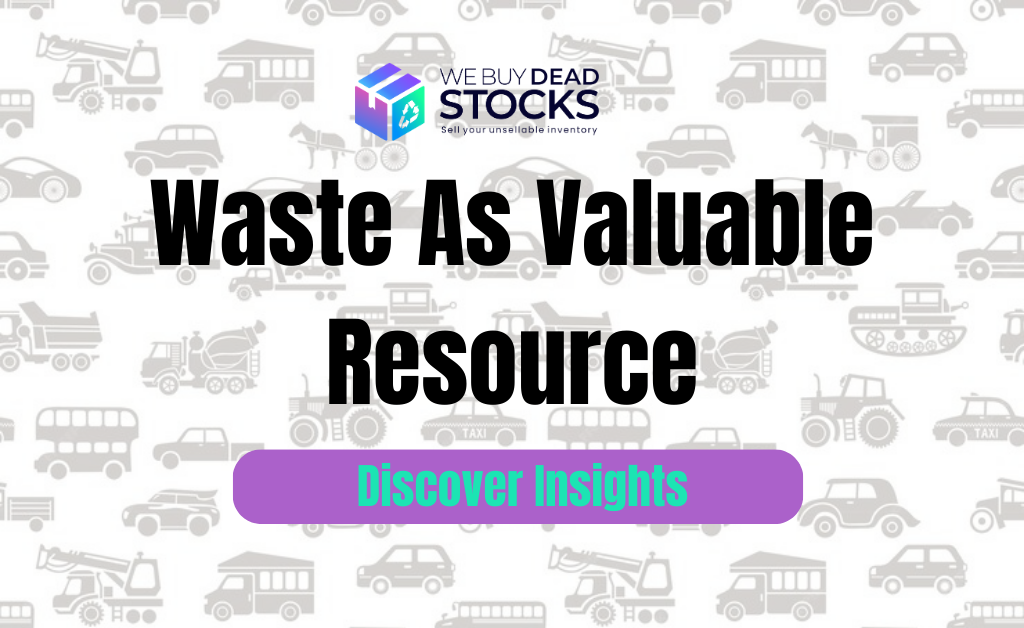Welcome to a journey through a hot business trend—managers cashing in on waste. In a world where green meets gold, companies are getting creative, turning trash into treasure. This blog explores where waste management and money-making collide. Join us as we dive into the stories of smart managers that buy dead stock, reducing their carbon footprint, and the reimagining of waste as a valuable resource.
The Shift in Business Paradigm
In the fast-paced business world, a big shift is happening—companies are rethinking how they make money. Let’s break it down into three points:
Traditional Revenue Streams Rethought:
In the long-standing history of commerce, businesses have adhered to tried-and-true methods of wealth generation, predominantly centred around selling products to consumers. However, in this era of transformative change, a reevaluation of these conventional practices is underway. Companies are now not only seeking to manage but also repurpose dead stock, injecting innovation into their financial strategies.
Unconventional Moves:
In today’s dynamic business landscape, a wave of novel approaches is gaining prominence. One particularly noteworthy trend is the paradigm shift is the reimagining of waste as a valuable resource. Companies are ingeniously harnessing this untapped potential, devising clever methods to transform waste into desirable commodities that people are eager to purchase. This dual strategy not only contributes to environmental sustainability but also serves as a lucrative avenue for profit.
Thriving with Adaptability:
In this era, success is intricately linked to adaptability. Companies that demonstrate the capacity to pivot, welcome novel concepts—such as the strategic decision to buy dead stock—and seamlessly transform challenges into opportunities emerge triumphant. Adaptability stands as the linchpin in thriving within the relentless pace of today’s market, allowing businesses to navigate the complexities with finesse and foresight.
Waste as a Valuable Resource
In the ever-changing business landscape, a shift is happening—turning what was trash into a valuable resource. Let’s dive into reimagining waste as a treasure and its impact on various industries.
Redefining Waste in Business:
Traditionally, waste meant useless stuff. Now, businesses see the value in transforming waste into things people will buy. This shift means looking at byproducts and unused stuff in a new light. Businesses are redefining these notions, recognizing that what may be considered waste can be more vital by transforming waste products into marketable commodities.
- Rethinking Waste: Companies are challenging the conventional definition of waste, considering how seemingly unimportant materials can be repurposed.
Industries Making Cash from Waste:
Many industries are leading the charge and reimagining of waste as a valuable resource. Buying dead stock and repurposing it is helping businesses generate money while being kind to the planet.
- Fashion Industry: Using surplus materials to make limited-edition collections cuts textile waste.
- Food and Beverage: Turning food waste into biodegradable packaging or energy sources shows profits in what was once thrown away.
Benefits of Using Waste:
Using waste brings two big wins—being eco-friendly and making money. It reduces the environmental impact and brings in profits, proving that waste can be a valuable resource.
- Reducing Environmental Footprint: Repurposing waste minimises the environmental impact of disposal, contributing to a more sustainable business model.
- Economic Gain: Companies that buy dead stock embracing these practices not only contribute to a healthier planet but also discover new revenue streams, illustrating that what was once waste can indeed be a valuable resource.
Challenges and Opportunities
Challenges in Making Waste Profitable:
Turning waste into money has its challenges. Recognizing and dealing with these issues is vital for making sustainable practices work.
- Logistical Hurdles: Sorting and processing diverse waste materials can be a challenge, needing efficient systems.
- Regulatory Compliance: Navigating waste regulations and meeting environmental standards is a hurdle for businesses repurposing waste.
- Initial Investment: The upfront costs associated with establishing waste-to-cash initiatives and transforming waste products into marketable commodities can be a deterrent for some businesses, requiring careful financial planning
Turning Challenges into Opportunities:
In challenges, there are chances for innovation and growth. Businesses that navigate obstacles well can benefit from the untapped potential of waste.
- Tech Boost: Using cutting-edge tech for waste processing and recycling can enhance efficiency and create new money-making possibilities.
- Teamwork: Partnerships and collaborations can share resources and knowledge, overcoming logistical and financial challenges.
- Education for Consumers: Teaching consumers about the value of eco-friendly products can create demand for green solutions.
Navigating the Waste-to-Cash Journey
Forward-thinking managers are vital in steering their organisations through the complexities of turning waste into money. Proactive leadership is crucial for overcoming challenges and seizing opportunities.
- Strategic Planning:
Managers should create solid plans covering waste management, resource allocation, and compliance for lasting success. - Employee Engagement:
Building a culture of sustainability, involving employees in waste reduction, contributes to overall success. - Continuous Adaptation:
Given the ever-changing nature of waste management and sustainability, managers must adapt, staying informed about tech advancements and regulations.
Future Trends and Predictions
- A Closer Look at Waste-to-Cash Strategies Exploring the trajectory of waste-to-cash strategies unveils a compelling narrative of innovation and sustainability. Forecasts suggest a continued surge in businesses reimagining waste as a valuable resource, strategically transforming waste products into marketable commodities.
- Advances in Waste Management
As we gaze into the future, the landscape of waste management is set to undergo transformative changes propelled by emerging technologies. These technological advancements play a pivotal role in the evolution of waste-to-cash strategies, enhancing efficiency, and opening new frontiers for businesses venturing into the realm of transforming waste products into marketable commodities.
- Reshaping the Business Landscape
The ripple effect of these waste-to-cash strategies extends beyond individual enterprises, promising to reshape the broader business landscape. The potential impact is profound, signalling a shift towards more sustainable and economically viable practices. As companies embrace the concept of reimagining waste as a valuable resource, they not only contribute to environmental well-being but also tap into innovative revenue streams.
Conclusion: Paving the Way for Green Prosperity
In the journey from traditional revenue to the innovation of waste-to-cash strategies, businesses aren’t just adapting—they’re changing how we see waste. This blog showcased unconventional approaches redefining waste as a valuable resource.We explored shifts in how companies make money and the importance of adaptability. We delved into challenges and opportunities in making waste profitable, revealing a roadmap to turn waste into a valuable resource.
Through strategic planning, employee engagement, and continuous adaptation, these managers are steering their organisations toward a more sustainable and economically viable future.





